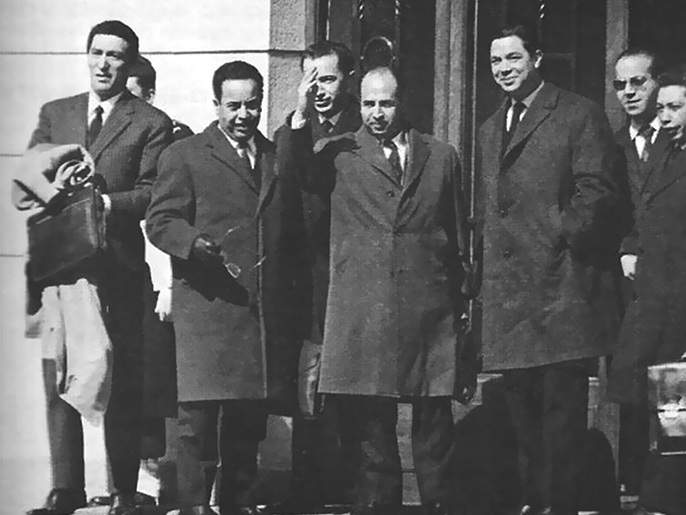The Evian Accords culminated in negotiations between Algeria and France to end the 132-year colonization of the country
.
The agreements led to the organization of a referendum for self-determination in which the Algerians voted in favor of independence from France.
France was forced to submit to the principle of negotiation with the Algerians after the losses it incurred following the outbreak of the liberation revolution on the first of November 1954, and as a result of the pressure of internal public opinion and the economic and financial crises of France, and the gradual conviction of the futility of the military option to confront the Algerian revolution.
Initial contacts
Following a number of secret contacts beginning in 1955, French President Charles de Gaulle recognized on September 16, 1959 the right of Algerians to self-determination, and on November 10 of the same year offered the leaders of the revolution to enter into negotiations to discuss conditions for stopping the fighting and ending The battles, then announced on June 14, 1960 his readiness to receive a delegation of the leaders of the revolution in Paris.
Negotiations began on June 25, 1960 in the French city of Moulins, and ended in failure after four days of meetings in which it became clear to the Algerian side that France was seeking to impose its vision.
The first Evian negotiations took place on May 20, 1961 in the city of Evian on the French-Swiss border. The Algerian delegation, headed by Karim Belkacem, included Ahmed Boumenjel, Saad Dahlab, Mohamed Siddik Ben Yahya, Tayeb Boulahrouf, Reda Malik, Ali Mengele and Kaid Ahmed, while the French delegation headed Louis Jukes.
This round faltered on June 13, 1961, due to the French side seeking to impose terms of an agreement unacceptable to the Algerians, such as separating the Sahara after the discovery of oil in 1956, preserving the privileges of European settlers and demilitarizing the National Liberation Army.
The decisive round
After a number of informal meetings, the Algerian and French delegations met in a new round of negotiations between 7 and 18 March 1962, which ended with the two parties agreeing to a ceasefire starting from 19 March of the same year.
The Evian Agreements included six chapters, stipulating:
Declaring a ceasefire and general amnesty.
Recognizing the territorial integrity of Algeria, and holding a referendum in which the Algerian people decide their fate within a period not exceeding six months.
Running the country during the transitional period with an interim government of three French and nine Algerians, in preparation for the referendum.
The settlers and their agents retain the rights that they had for three years before choosing their final citizenship: either Algerian, so they become Algerian citizens, or French, who are treated as foreigners.
- The evacuation of the French forces from Algeria within three years, while retaining the military naval base in Marsa Al-Kabir in the west of the country for 15 years and military airports in Annaba (east), Boufarik (central) and Bechar (south), and Reggane base in the south of the country for five years.
France retains economic interests and cultural privileges, and the two sides pledged to cooperate in various economic and cultural fields, in return for Algeria receiving French financial aid.
Evaluation of the agreements
The Algerians had different views on evaluating the agreements. Some of them believed that they linked the fate of Algeria to France by allowing the French to maintain military bases in Algeria, enabling settlers to retain their privileges, and granting French companies the right to exploit the country’s wealth.
On the other hand, others see the agreements as a victory for the Algerians because they saved them from colonialism that lasted 132 years.
Also, the reservations of the first party were removed after the evacuation of the French forces after years of independence and a decision was taken to nationalize oil and the lands that were in the possession of the centenarians.
On the other hand, the Evian agreements were opposed by supporters of what was known as “French Algeria”, and some settlers who benefited from the presence in Algeria tried to obstruct the agreements by establishing the secret military organization that carried out bombings, assassinations and acts of violence.
Self-determination
The referendum for self-determination was held in Algeria on July 1, 1962, and the results were announced the next day, when 97.5% of the participants voted in support of independence, and on July 3, French President Charles de Gaulle announced the recognition of Algeria's independence, and the leaders of the revolution chose July 5 / July 1962 is an official date for the declaration of independence because it marks the anniversary of the French occupation on July 5, 1830.

